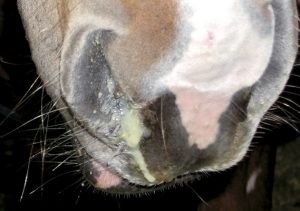There’s always an epidemic of something, somewhere. I’ve read on the internet there are entire continents devoid of humans because of “swine flu”, “bird flu”, “Asian flu”. What…there aren’t? I guess there’s no vaccine for paranoia. Biosecurity is a fairly new term used to outline measures to control disease outbreaks. Some of these are effective, common sense practices. But some can go a little overboard. A few years ago we had an EHV outbreak here in the western US. One barn with about forty horses in my area put yellow police tape around the entire facility, posted an armed guard 24/7, allowing NO veterinarians to enter the premises. Sick horses had to be transported across the police tape (and across the street) to be treated and were NOT allowed to return! Granted, there WAS an active case 300 miles away, but DANG…they were careful!, Surely we want to limit our risk of disease transmission, but unless we live in a bubble, there is always a risk.
 “Exposure” can mean any where up to a mile away from an infected horse. Obviously, close proximity to sick animals increases the risk, but most infectious diseases are either airborne or carried by insects–neither of these factors have any great respect for fences. And, just to make things a bit more complicated, there are “inapparent carriers”. Just because a horse is not blowing green snot and coughing like a three-pack-a-day-smoker doesn’t mean he is not capable of spreading respiratory disease. Let that sink in a minute.
“Exposure” can mean any where up to a mile away from an infected horse. Obviously, close proximity to sick animals increases the risk, but most infectious diseases are either airborne or carried by insects–neither of these factors have any great respect for fences. And, just to make things a bit more complicated, there are “inapparent carriers”. Just because a horse is not blowing green snot and coughing like a three-pack-a-day-smoker doesn’t mean he is not capable of spreading respiratory disease. Let that sink in a minute.
So we need to use some common sense. Don’t haul snotty, coughing horses…duh? Ask your vet for the vaccine appropriate for your area. (These products are not nearly as effective as the manufacturers’ claim, but they can afford some protection.) Horses housed out doors or at least in well-ventilated areas are at lower risk. If you have an infected horse in your barn, it is probably too late to move out..everybody got exposed at the same time! But in the face of an outbreak, checking temperature twice daily may be the best pre-emptive measure so treatment can be initiated early. Anything above 101.5 would warrant a vet exam. Finally, stop worrying and quit whining. Horses have been around a lot longer than vaccine companies. These magnificent creatures are going to live in spite of what we do to “save” ’em. Strive for perfection, ride with purpose.

